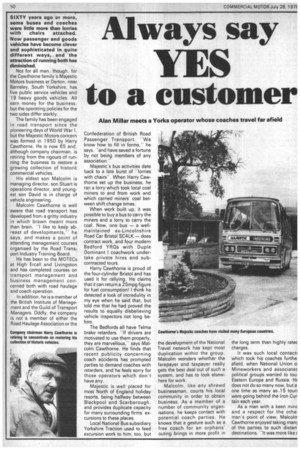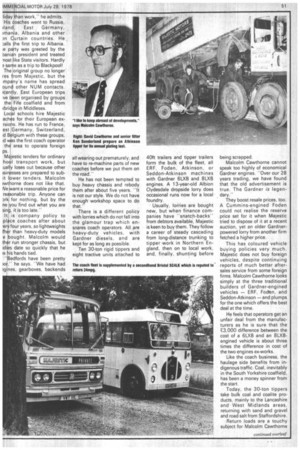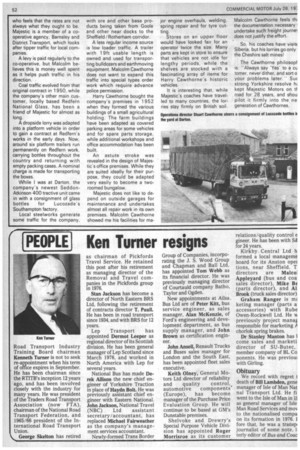Always say
Page 52

Page 53

Page 54

If you've noticed an error in this article please click here to report it so we can fix it.
YES
to a customer
Alan Millar meets a Yorks operator whose coaches travel far afield
SIXTY years ago or more, some buses and coaches were little more than lorries with chairs attached. Now passenger and goods vehicles have become clever and sophisticated in quite different ways, and the attraction of running both has diminished.
Not for all men, though, for the Cawthorne family's Majestic Motors business at Darton, near Barnsley, South Yorkshire, has five public service vehicles and 19 heavy goods vehicles. All earn money for the business, but the operating policies for the two sides differ starkly.
The family has been engaged in road transport since the pioneering days of World War I, hut the Majestic Motors concern was formed in 1950 by Harry Cawthorne. He is now 65 and, although company chairman, is retiring from the rigours of running the business to restore a growing collection of historic commercial vehicles.
His eldest son Malcolm is managing director, son Stuart is operations director, and youngest son David is in charge of vehicle engineering.
Malcolm Cawthorne is well aware that road transport has developed from a gritty industry in which brawn meant more than brain. "I like to kcal) abreast of developments,'' he says, and makes a point of attending management courses organised by the Road Transport Industry Training Board.
He has been to the MOTECs at High Ercall and Livingston and has completed courses on transport management and business management concerned both with road haulage and coach operation.
In addition, he is a member of the British Institute of Management and the Guild of Transport Managers, Oddly, the company is not a member of either the Road Haulage Association or the
Confederation of British Road Passenger Transport. "We know how to fill in forms,he says, "and have saved a fortune by not being members of any association."
Majestie's bus activities date back to a late burst of "lorries with chairs". When Harry Cawthorne set up the business, he ran a lorry which took local coal miners to and from work and which carried miners' coal between shift change times.
When work built up, it was possible to buy a bus to carry the miners and a lorry to carry the coal. Now, one bus — a wellmaintained ex-Lincolnshire Road Car Bristol SC4LK — does contract work, and four modern Bedford YRQs with Duple Dominant I coachwork undertake private hires and subcontracted tours.
Harry Cawthorne is proud of the four-cylinder Bristol and has used it for rallying. He claims that it can return a 25mpg figure for fuel consumption! ! think he detected a look of incredulity in my eye when he said that, but told me that he had proved the results to equally disbelieving vehicle inspectors not long before.
The Bedfords all have Telrna brake retarders. "If drivers are motivated to use them properly, they are marvellous," says Malcolm Cawthorne. He finds that recent publicity concerning coach accidents has prompted parties to demand coaches with retarders, and he feels sorry for those operators which don't have any.
Majestic is well placed for most North of England holiday resorts, being halfway between Blackpool and Scarborough, and provides duplicate capacity for many surrounding firms' excursions to these places.
Local National Bus subsidiary Yorkshire Traction used to feed excursion work to him, too, but the development of the National Travel network has kept most duplication within the group. Malcolm wonders whether the farepayer and taxpayer really gets the best deal out of such a system, and has to look elsewhere for work.
Malcolm, like any shrewd businessman, courts his local community in order to obtain business, As a member of a number of community organisations, he keeps contact with potential coach parties. He knows that a gesture such as a free coach for an orphans' outing brings in more profit in the long term than highly ratec charges.
It was such local contact! which took his coaches furtha afield, when National Union a Mineworkers and associatec political groups wanted to too Eastern Europe and Russia. HE does not do so many now, but a one time as many as .1 5 tour: were going behind the Iron Cur fain each year, As a man with a keen minc and a respect for the othe man's point of view, Malcolrr Cawthorne enjoyed taking man) of the parties to such distan. destinations. "It was more like liday than work,he admits. His doaches went to Russia,
ilandl, East Germany, imania, Albania and other )n Curtain countries. He .3alls he first trip to Albania. e paty was greeted by the bani n president and treated nost like State visitors. Hardly a sanfle as a trip to Blackpool! The original group no longer" res flrom Majestic, but the mp ,
ainy s name has spread ound other NUM contacts. icently, East European trips ve been organised by groups the Fife coalfield and from (bridge in Middlesex.
Local schools hire Majestic aches for their European exrsio s. He has run to France, est Germany, Switzerland, id B lgium with these groups, id 4as the first coach operator th area to operate foreign Ps.
Majestic tenders for ordinary ho 1 transport work, but ual y loses out because other 'sin sses are prepared to subit I wer tenders. Malcolm
a
iwt orne does not like that. Wei.,,t ant a reasonable price for re sonable trip. Anyone can Drk for nothing, but by the ne you find out what you are ;in , it is too late."
It, is company policy to place coaches after about 'erY four years. so lightweights th4r than heavy-duty models e bought. Malcolm would ther run stronger chassis, but idies date so quickly that he is flis hands tied.
"lBedfords have been pretty he says, -We have had tg nes, gearboxes, backends
all wearing out prematurely, and have to re-machine parts of new coaches before we put them on the road."
He has not been tempted to buy heavy chassis and rebody them after about five years. "It is not our style. We do not have enough workshop space to do that."
There is a different policy with lorries which do not fall into the glamour trap which ensnares coach operators All are heavy-duty vehicles, with Gardner diesels, and are kept for as long as possible.
Ten 30-ton rigid tippers and eight tractive units attached to 40ft trailers and tipper trailers form the bulk of the fleet, all ERF, Foden, Atkinson, or Seddon-Atkinson machines with Gardner 6LXB and 8LXB engines. A 13-year-old Albion Clydesdale dropside lorry does occasional runs now for a local foundry.
Usually, lorries are bought new, but when finance companies have -snatch-backsfrom debtors available, Majestic is keen to buy them. They follow a career of steady cascading from long-distance trunking to tipper work in Northern England, then on to local work, and, finally, shunting before Malcolm Cawthorne cannot speak too highly of economical Gardner engines. "Over our 28 years trading, we have found that the old advertisement is true. The Gardner is legendary.''
They boost resale prices, too. A Cummins-engined Foden could not realise the reserve .price set for it when Majestic tried to dispose of it at a recent auction, yet an older Gardnerpowered lorry from another firm fetched a higher price.
This has coloured vehicle buying policies very much. Majestic does not buy foreign vehicles, despite continuing reports of much better aftersales service from some foreign firms. Malcolm Cawthorne looks simply at the three traditional builders of Gardner-engined vehicles — ERF, Foilen, and Seddon-Atkinson — and plumps for the one which offers the best deal at the time.
He feels that operators get an unfair deal from the manufacturers as he is sure that the £3,000 difference between the cost of a 6LXB and an 8LXBengined vehicle is about three times the difference in cost of the two engines ex-works.
Like the coach business, the haulage side benefits from indigenous traffic. Coal, inevitably in the South Yorkshire coalfield, has been a money spinner from the start.
Today, the 30-ton tippers take bulk coal and coalite products, mainly to the Lancashire and West Midlands areas, returning with sand and gravel and road salt from Staffordshire.
Return loads are a touchy subject for Malcolm Cawthorne who feels that the rates are not always what they ought to be. Majestic is a member of a cooperative agency, Barnsley and District Transport, which looks after tipper traffic for local companies.
A levy is paid regularly to the co-operative, but Malcolm believes this is money well spent as it helps push traffic in his direction.
Coal traffic evolved from that original contract in 1950, while the company's other main customer, locally based Redfern National Glass, has been a friend of Majestic for almost as long.
A dropside lorry was adapted into a platform vehicle in order to gain a contract at Redfern's works in the early days. Now, around six platform trailers run permanently on Redfern work, carrying bottles throughout the country and returning with empty packing cases. A nominal charge is made for transporting the boxes.
While I was at Darton, the company's newest SeddonAtkinson 400 tractive unit came in with a consignment of glass bottles for Lucozade's Southampton factory.
Local steelworks generate some traffic for the company, with ore and other base products being taken from Goole and other near docks to the Sheffield/Rotherham corridor.
A less regular income source is low loader traffic. A trailer with 19ft usable length is owned and used for transporting bulldozers and earthmoving equipment. Malcolm Cawthorne does not want to expand this traffic into special types order work which require advance police permission.
Harry Cawthorne bought the company's premises in 1952 when they formed the various buildings of a small agricultural holding. The farm buildings have been adapted as covered parking areas for some vehicles and for spare parts storage, while additional workshops and office accommodation has been built.
An astute stroke was revealed in the design of Majestic's office premises. While they are suited ideally for their purpose, they could be adapted very easily to become a tworoomed bungalow.
Majestic does not like to depend on outside garages for maintenance and undertakes almost all repair work in its own premises. Malcolm Cawthorne showed me his facilities for ma jor engine overhauls, welding, spring repair and for tyre cutting.
Stores on an upper floor would have looked fair for an operator twice the size. Many parts are kept in store to ensure that vehicles are not idle for lengthy periods, while the shelves are stocked with a fascinating array of items for Harry Cawthorne's historic vehicles.
It is interesting that. while Majestic's coaches have travelled to many countries, the lorries stay firmly on British soil. ,Malcolm Cawthorne feels tft the documentation necessary undertake such freight journe), does not justify the effort.
So, his coaches have visit€ Siberia, but his lorries go only the Cheshire salt mines!
The Cawthorne philosopt is "Always say 'Yes' to a cu tomer, never dither, and sort o your problems later."' Suc strong Yorkshire resolve hi kept Majestic Motors on th road for 28 years, and shou pilot it firmly into the ne generation of Cawthornes.




























































































